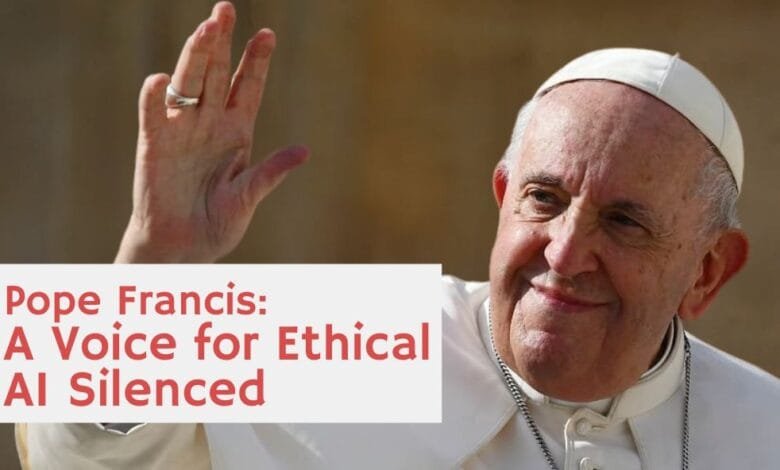Pope Francis Dies at 88: A Powerful Voice for Human-Centric AI Falls Silent

▼ Summary
– Pope Francis passed away on April 21, 2025, at the age of 88, due to complications from a cerebral stroke, marking the end of a decade-long impactful papacy.
– He was renowned for his humility and direct engagement with global issues such as poverty, climate change, and the ethics of technology, particularly Artificial Intelligence (AI).
– Pope Francis emphasized the importance of human dignity in evaluating emerging technologies, arguing that AI should be ethically sound only if it respects this fundamental principle.
– He expressed concerns about AI’s potential to amplify misinformation and manipulate minds for economic, political, and ideological purposes, urging for proper human control over AI decisions.
– His legacy includes a strong advocacy for using technology to improve the well-being of humanity and a call to ban lethal autonomous weapons, highlighting the need for ethical reflection in technological advancements.
The world is processing the somber news today: Pope Francis, a figure who transcended religious boundaries to become a global voice on pressing issues like poverty, climate change, and increasingly, the ethics of technology, passed away yesterday, April 21, 2025. Reports indicate the 88-year-old pontiff succumbed to complications following a cerebral stroke, marking the end of a papacy that profoundly shaped the last decade. His passing is felt deeply across the globe, a significant loss of a leader known for his humility and direct engagement with the challenges of our time.
While Pope Francis will be remembered for many things – his outreach to the marginalized, his calls for environmental stewardship, his efforts at interfaith dialogue – his later years saw him emerge as a surprisingly forceful and necessary commentator on the trajectory of Artificial Intelligence. For those of us immersed in the rapid advancements of AI, his perspective offered a crucial, humanistic counterpoint to purely technological or market-driven considerations.
We need to ensure and safeguard a space for proper human control over the choices made by artificial intelligence programs: Human dignity itself depends on it.
Pope Francis
It wasn’t a Luddite’s rejection of progress. Instead, Pope Francis approached AI with a blend of cautious optimism and profound ethical concern. He acknowledged its potential, describing the burgeoning capabilities as “both exciting and disorienting“. Yet, he consistently recentered the conversation on a fundamental principle: the “intrinsic dignity of every man and woman“. This, he argued, must be the “key criterion in evaluating emerging technologies“. AI, in his view, could only be considered “ethically sound to the extent that they help respect that dignity“.
His warnings were pointed and relevant to the core challenges preoccupying developers, ethicists, and policymakers today. He expressed deep concern about AI’s potential to amplify misinformation and “distort facts”, fearing its misuse “to manipulate minds for economic, political and ideological ends” – a reality we grapple with daily in the digital sphere.
Crucially, he questioned the locus of control. As AI systems become more complex, Pope Francis issued an urgent plea to “ensure and safeguard a space for proper human control over the choices made by artificial intelligence programs”, stating plainly that “human dignity itself depends on it”. He challenged the tech world to examine its motivations: Is AI being developed to truly “satisfy the needs of humanity, to improve the well-being and integral development of people”, or does it risk primarily serving to “enrich and increase the already high power of the few technological giants”?
Technological developments that do not lead to an improvement in the quality of life of all humanity, but on the contrary aggravate inequalities and conflicts, can never count as true progress … Artificial intelligence ought to serve our best human potential and our highest aspirations,
not compete with them.Pope Francis
His concerns extended to the potential for AI to exacerbate inequalities, warning against a future where technological benefits, like advanced healthcare, become a “‘medicine for the rich’ model”. He was also an outspoken opponent of “lethal autonomous weapons”, advocating for their ban and labeling them an “existential risk”.
Perhaps most philosophically resonant for the tech community was his challenge to our very definition of “intelligence” when applied to machines. “Are we sure we want to continue to call ‘intelligence’ what intelligence is not?” he asked, probing whether using the term lightly signifies a “surrender to technocratic power”.
The passing of Pope Francis marks the loss of a unique global leader who dared to ask difficult questions about the tools we are building. He wasn’t an engineer or a coder, but his consistent focus on humanity provided an essential ethical compass. At a time when technology often races ahead of regulation and ethical reflection, his voice urging caution, responsibility, and a steadfast commitment to human dignity feels more vital than ever. His message wasn’t anti-technology; it was profoundly pro-humanity. As the AI revolution continues, his poignant questions and ethical framework remain – a legacy challenging us all to build a future where technology truly serves, and never subverts, the human spirit.



